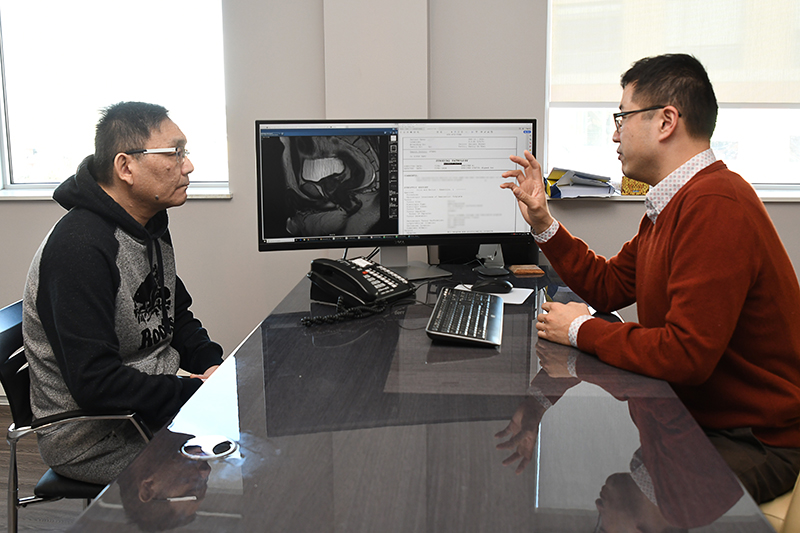Frank Wang knew something was wrong.
It was the fall of 2019 and the 54-year-old just hadn’t been feeling himself. Following an appointment with his family doctor, Frank completed what’s known as a fecal immunochemical test (FIT) to screen for colorectal cancer.
Introduced in Ontario in 2019, the FIT replaced the previous fecal occult blood test (FOBT) to screen individuals 50 years and older who are at average risk of colorectal cancer.
“Colorectal cancer, also known as ‘colon cancer’ or ‘bowel cancer’, is the second most commonly diagnosed cancer in Ontario and the second most common cause of cancer deaths,” said Markham Stouffville Hospital (MSH) General and Oncologic Surgeon, Dr. Simon Yang.
“FIT is a simple and safe at-home test that checks someone’s stool for tiny amounts of blood that could be caused by a colon cancer and/or pre-cancerous polyps, which are growths that can turn into cancer over time.”
When Frank‘s FIT showed blood in his stool, he was immediately sent for a colonoscopy. Considered the most accurate test for colorectal cancer, colonoscopies have been proven to detect the disease early and save lives.
Frank’s colonoscopy confirmed a cancer diagnosis. As a resident of Markham for more than 25 years, Frank asked to be referred to MSH for his treatment.
“I met with Dr. Yang right away and had my surgery by the end of January,” said Frank, who has also been receiving chemotherapy in The Shakir Rehmatullah Cancer Clinic as part of his care.
“Everyone at MSH has been very helpful and made me feel as comfortable as possible.”
In addition to the health concerns that made him seek treatment, Frank credits the support he was providing to his elderly parents with their health issues that helped him to take action early.
“You really have to be more proactive with your health once you get to a certain age,” he shares.
It’s a lesson that likely saved Josefina Baybayan’s life.
Shortly after her 50th birthday, Josefina completed a FIT as part of routine screening.
“Everyone at MSH has been very helpful and made me feel as comfortable as possible.”
“I wasn’t in any rush to do it, but the test was positive,” she explains.
A biopsy of polyps removed during Josefina’s colonoscopy came back as cancerous and she had colon resection surgery performed by Dr. Yang, as well as chemotherapy.
“Dr. Yang took out 48 lymph nodes and one of them was cancerous, so it was really good it was discovered so early,” she said.
As someone who has lived in Markham for close to 20 years, Josefina was also grateful to have cancer care services so close to home at MSH.
“I was thankful I didn’t have to go downtown for care and had a great experience at MSH,” she said.
“Dr. Yang was very compassionate and all the staff were fantastic.”
For Dr. Yang, Frank and Josefina’s stories are examples of both the importance of FIT screening and the extraordinary patient experience MSH offers.
“When colorectal cancer is caught early, there is a higher chance for cure, with 90 per cent of people being disease free at five years,” Dr. Yang says.
“Here at MSH, we’re proud to be able to offer patients state-of-the-art surgery and treatment. In fact, we’re one of a few hospitals in Ontario that offer transanal minimally invasive surgeries (TAMIS) and transanal total mesorectal excision (TaTME) procedures to treat advanced polyps and rectal cancers.
“Such new techniques not only provide better cancer-related outcomes, but also significantly improve quality of life of our patients.”
The ultimate goal, explains Dr. Yang, “is to provide a care experience that supports our patients from their initial referral, through to assessment, diagnosis and treatment.”
For more information on FIT screening, visit www.msh.on.ca/colonhealth.
